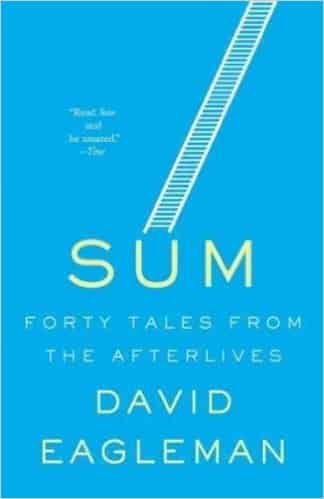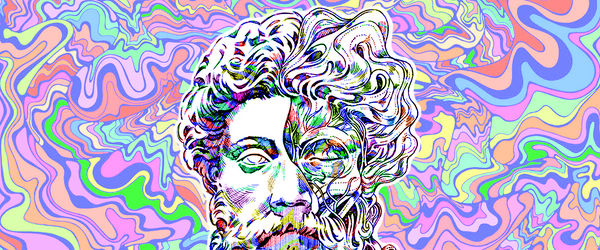Jordan Bates • • 7 min read
Possibilianism: The Awesome Middle Ground Between Strict Atheism and Grandma’s Christianity

Does anything happen after we die?
Does the universe have some ultimate purpose or significance?
Is existence somehow “divine” or “sacred”?
Was the cosmos created by some kind of all-powerful force or being?
When it comes to huge and potentially unanswerable questions such as these, I consider myself a possibilian.
In a nutshell, this means, “I don’t know, but I’m open to exploring the possibilities.”
Wikipedia defines possibilianism as follows:
“Possibilianism is a philosophy which rejects both the diverse claims of traditional theism and the positions of certainty in strong atheism in favor of a middle, exploratory ground.”

The term was coined by Robbie Parrish, a friend of neuroscientist David Eagleman. Eagleman went on to define the term in his work of fiction, Sum: Forty Tales From the Afterlives, and has since popularized the term. When asked whether he was an atheist or religious person during a National Public Radio interview in 2009, Eagleman replied:
“I call myself a possibilian: I’m open to… ideas that we don’t have any way of testing right now.”
In a subsequent interview with the New York Times, Eagleman expanded on the definition:
“Our ignorance of the cosmos is too vast to commit to atheism, and yet we know too much to commit to a particular religion. A third position, agnosticism, is often an uninteresting stance in which a person simply questions whether his traditional religious story (say, a man with a beard on a cloud) is true or not true. But with possibilianism I’m hoping to define a new position — one that emphasizes the exploration of new, unconsidered possibilities. Possibilianism is comfortable holding multiple ideas in mind; it is not interested in committing to any particular story.”
In a New Yorker profile of Eagleman, Burkhard Bilger further elaborated on Eagleman’s viewpoint:
“Science had taught him to be skeptical of cosmic certainties, [Eagleman] told me. From the unfathomed complexity of brain tissue—‘essentially an alien computational material’—to the mystery of dark matter, we know too little about our own minds and the universe around us to insist on strict atheism, he said. ‘And we know far too much to commit to a particular religious story.’ Why not revel in the alternatives? Why not imagine ourselves, as he did in Sum, as bits of networked hardware in a cosmic program, or as particles of some celestial organism, or any of a thousand other possibilities, and then test those ideas against the available evidence? ‘Part of the scientific temperament is this tolerance for holding multiple hypotheses in mind at the same time,’ he said. ‘As Voltaire said, uncertainty is an uncomfortable position. But certainty is an absurd one.’”
I first encountered possibilianism several years ago and was immediately enthralled by the position. It seemed I had found a religious and philosophical viewpoint that captured how I felt about the grandest of questions. That is, I feel that the possible answers are endless, and I’m enthusiastic about contemplating and testing a variety of possibilities.
Distinguishing Possibilianism From Agnosticism, Ignosticism, and Atheism
There is a certain amount of overlap between possibilianism, agnosticism, ignosticism, and atheism. This truth is perhaps best exemplified by the fact that I consider myself simultaneously to be, in some sense, a possibilian, atheist, ignostic, and agnostic, among other things. Let’s try to disentangle these related terms to see how this could be the case.
In the broadest sense, atheism simply refers to the absence of belief in deities. By this definition, I am certainly an atheist; I do not at present possess any belief in the existence of deities. In the strictest sense¹, though, atheism is the position that nothing divine, spiritual, transcendent, or supernatural exists. I’m uncomfortable with this latter form of atheism, as it often manifests as an excessive, unjustified certitude—a new fundamentalism. I don’t believe we have accumulated sufficient data to reject outright all claims regarding the existence of the divine, spiritual, transcendent, and supernatural.
Part of the problem here is that we do not have sufficiently clear definitions of words like “God,” “transcendent,” “divine,” “spiritual,” and “supernatural.” This problem gives rise to the position of ignosticism, which is “the idea that the question of the existence of God is meaningless, because the term ‘god’ has no unambiguous definition.” For Christians, “God” refers to an anthropomorphized being in a cloud paradise who built the universe and watches our actions. For pantheists, “God” simply refers to nature itself. This vast disparity of definitions suggests the problem with outright rejecting all conceptions of the divine, spiritual, transcendent, and supernatural—quite a vast and diverse heap of ideas to reject all at once! To some extent, I am ignostic, because I recognize this problem of ambiguity in questions of the existence of “God.”
Agnosticism is the position that the answers to certain questions—especially those concerning the divine, spiritual, transcendent, and supernatural—are unknown and perhaps unknowable. Robert Anton Wilson famously espoused “generalized agnosticism,” or “agnosticism about everything.”
I am an agnostic. As far as I’m aware, agnosticism is the position closest to possibilianism, and the major distinction between the two is attitudinal. I think it would be fairly accurate to call possibilianism a “rebranding” of agnosticism which puts a more optimistic, exploratory spin on the position. According to Wikipedia, “The possibilian perspective is distinguished from agnosticism in its active exploration of novel possibilities and its emphasis on the necessity of holding multiple [ideas] at once if there is no available data to privilege one over the others. Eagleman has emphasized that possibilianism reflects the scientific temperament of creativity and intellectual humility in the face of ‘the known unknowns.’”
I think of possibilianism as “sexed-up agnosticism.” Whereas agnosticism tends to say, “We don’t know, period,” possibilianism says, “We don’t know, but look at all the exciting possibilities we can explore!”
Kevin Kelly, the founding editor of Wired magazine, elaborated on the subtle differences between possibilianism and agnosticism:
“I would add a few more points about the difference between possibilism and agnosticism. We have to acknowledge that both Possibilians and Agnostics belong the church of I Don’t Know. Both positions support I-don’t-knowism. And I-don’t-knowism is the founding beatitude of science. But here’s how they are different:
Agnostics end with the lack of an answer.
Possibilians begin with the lack of an answer.
Agnostics say, we can’t decide between this and that.
Possibilians say, there are other choices than this or that.
Agnostics say, I Don’t Know, it’s impossible to answer that question.
Possibilians say, I Don’t Know, there must be better questions.
Both start in humility, but agnosticism is bounded by our great ignorance, while possibilism is unbounded by our limited knowledge.”
Possibilianism: A Middle Ground for Curious, Imaginative Skeptics
Possibilianism embraces scientific skepticism, while admitting that the scientific method has thus far not produced sufficient evidence for outright rejecting all notions of the divine, spiritual, transcendent, and supernatural.
I should note that I don’t think possibilianism entails a belief that “all possibilities are created equal.” For instance, I think the strict atheist’s position that deities (as historically defined by religions) do not exist is immeasurably more likely to be true than the position that some kind of anthropomorphized god exists and created the universe.
I am a passionate advocate for the scientific method—the process of conducting experiments based on testable hypotheses to construct ever-more-accurate models of reality. However, I also recognize that what science has given us are, indeed, models. Science does not deal in absolutes; it is not an ideology, but a methodology. Genuine scientists in every field of study will be the first to acknowledge that our current models—particularly of quantum mechanics, the origins of the universe, the nature of consciousness, and other Hard Problems—are incomplete.
Possibilianism does not try to sweep this incompleteness under the rug. In the spirit of true science, it affirms the idea that until we have better data, we shouldn’t dismiss any possibilities. Maybe we’re living in a simulation created by demigod-like extraterrestrials or posthumans. Maybe Aldous Huxley’s Mind at Large—an all-permeating consciousness—exists. Perhaps there is something substantial in the Logos or other extradimensional beings Terence McKenna claimed to have contacted via ingestion of entheogenic compounds.
The possibilities are innumerable. And at present, I am not prepared to dismiss them. I would much rather explore them, wonder about them, and test them whenever possible.
Above all, I am one who is in profound awe of existence, nature, and consciousness. This awe, as it turns out, is all I need to affirm my existence and maintain an insatiable curiosity.
Far from needing final answers, I am content to spend my life cherishing the data we gather, refining my models of reality, reveling in possibility, dancing with uncertainty, and kissing ambiguity.
———
If you want to learn to embrace uncertainty…
Our new course is for you:
30 Challenges to Enlightenment

Footnotes:
- Richard Dawkins, the scientist pictured in the featured image of this essay, is widely considered to be a quintessential example of strict atheism. Dawkins himself defines his atheism as a 6.9 on his own spectrum of theistic probability (the highest rating is 7), “which represents a ‘de facto atheist’ who thinks ‘I cannot know for certain but I think God is very improbable, and I live my life on the assumption that he is not there.'” Dawkins does admit some degree of uncertainty/agnosticism, and as far as I know, he hasn’t spent much time addressing non-Christian concepts of the divine, spiritual, transcendent, and supernatural. So perhaps he is not the best figure to employ to represent the strictest atheism, but his status as a kind of figurehead of strict atheism made him an obvious choice. I should clarify that I have nothing against Dawkins. Based on my limited perusal, I can say that I appreciate and support Dawkins’ work as a writer and scientist.

Jordan Bates
Jordan Bates is a lover of God, father, leadership coach, heart healer, writer, artist, and long-time co-creator of HighExistence. — www.jordanbates.life


![Seneca’s Groundless Fears: 11 Stoic Principles for Overcoming Panic [Video]](/content/images/size/w600/wp-content/uploads/2020/04/seneca.png)







